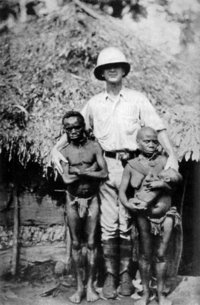
During the 16th Pan African Film & Arts Festival (PAFF) in Los Angeles held February 7-18, one can immerse themselves in African culture and politics through films rarely seen here made by many talented African filmmakers. African issues such as Darfur, AIDS, poverty, etc, are well known to most Americans essentially through the help of Hollywood celebrities using the media to draw attention to their cause. But many of the films shown at PAFF, directed by Africans from all over the continent, give the viewer a unique opportunity to glimpse inside these cultures and experience how the different African nations are both unique and similar to each other, and, in some ways perhaps, to our own nation.
The fact that the name of Burkina Faso’s past president, Thomas Sankara, is essentially unknown to most Americans is not surprising. In fact, if we were offered one million dollars to point to the African nation of Burkina Faso on a map, most of us would lose. Director Robin Shuffield’s Thomas Sankara: The Upright Man is a documentary of Sankara who, between 1983 and 1987 at age 33, became leader of Burkina Fasso, a small landlocked nation located north of the smaller nations of the Ivory Coast, Ghana, Togo, Benin, south of Mali, and west of Niger. This small nation of Africa has been colonized by the French since 1896, and was once called Upper Volta. Sankara was eventually assassinated in a coupe led by his right hand man, “friend” and confidant, Blaise Compaoré, and discretely buried in an unmarked grave.
Many, to this day, consider the short-lived, revolutionary ideas that Sankara implemented in his brief term a tragic waste and missed opportunity for his country. Armed with a Marxist vision that might have made his nation a triumphant example of this ideology, Sankara began his presidency redirecting the political power base to create a fair, independent state through such successful programs that he was seen as a threat by many neighboring African nations sympathetic to colonial ideas and to others including Francois Mitterand, prime minister of France at that time. In the first year of his presidency, Sankara replaced all Mercedes owned by government officials with cheaper cars. He then began health reforms vaccinating over a million people in one week, a record recognized by the World Health Organization; instituted unprecedented women’s equality in all forms of society, banned female circumcision, polygamy and promoted contraception; began railroads and environmental protection programs; and attempted to use all the resources of his nation for production of food and clothing to prevent exploitation of outside imperialist forces. Changing the name of his small nation to Burkina Faso in his first year of leadership, meaning “The Land of the Upright Man,” is indicative of the vision that he had for his people.
Subtitled from French, director Shuffield allows Sankara’s charisma and dedication to Marxist ideals come through in many original filmed speeches to his people. Multiple close-ups of Sankara’s smiling face often reveal an intense yet approachable character. When he tells his people that: “The one who feeds you induces his will upon you” one can sense that this was a leader of the people who whole-heartedly believed in a vision of self-sufficiency and a refusal to “afro-pessimism.”
Shuffield has picked compelling footage that portrays Sankara’s earnestness, integrity, morals, and humor. An unwavering commitment to his leftist ideals, his people and his country are made indelible through a linear montage of interviews, news clips, and videos both old and new during Sankara’s time as leader and after. As a result, we see those who worked with him, those who benefited from his policies, and those who opposed him both in his own country and world leaders abroad. In an interview with a member of his party reflecting on Sankara’s regime, he lends insight into the reason that Sankara had the ability to say things many other leaders would not; because he never saw himself as a god, and he never saw any leaders of any other country as one either. He was a true Marxist in the egalitarian sense.
Shuffield, however, does not paint Sankara’s revolution as ideal and all good. We see clips of newscasts exposing problems of Sankara’s impatience to incorporate his social ideas into the culture. In a teacher’s strike, Sankara makes the mistake of not recognizing their grievances and fires them all, hiring under-trained and incompetent teachers to replace them, damaging the educational system. Sankara’s ideals and impatience were perhaps what many say had ultimately led to creating unrest in the country by some who did not like where his philosophy was taking them.
Although, the back story of Sankara’s early life before his rise to leader is disappointingly absent, and much of the borrowed film footage is slightly blurred, the story is elucidating. Even though we see Sankara’s ideas fail in the end, at the very least the film is an interesting look at an independent government accomplishing positive results in record time when left to its own resources. And if that’s not enough, it’s worth the price of the film for no other reason than to broaden your knowledge of Africa.






